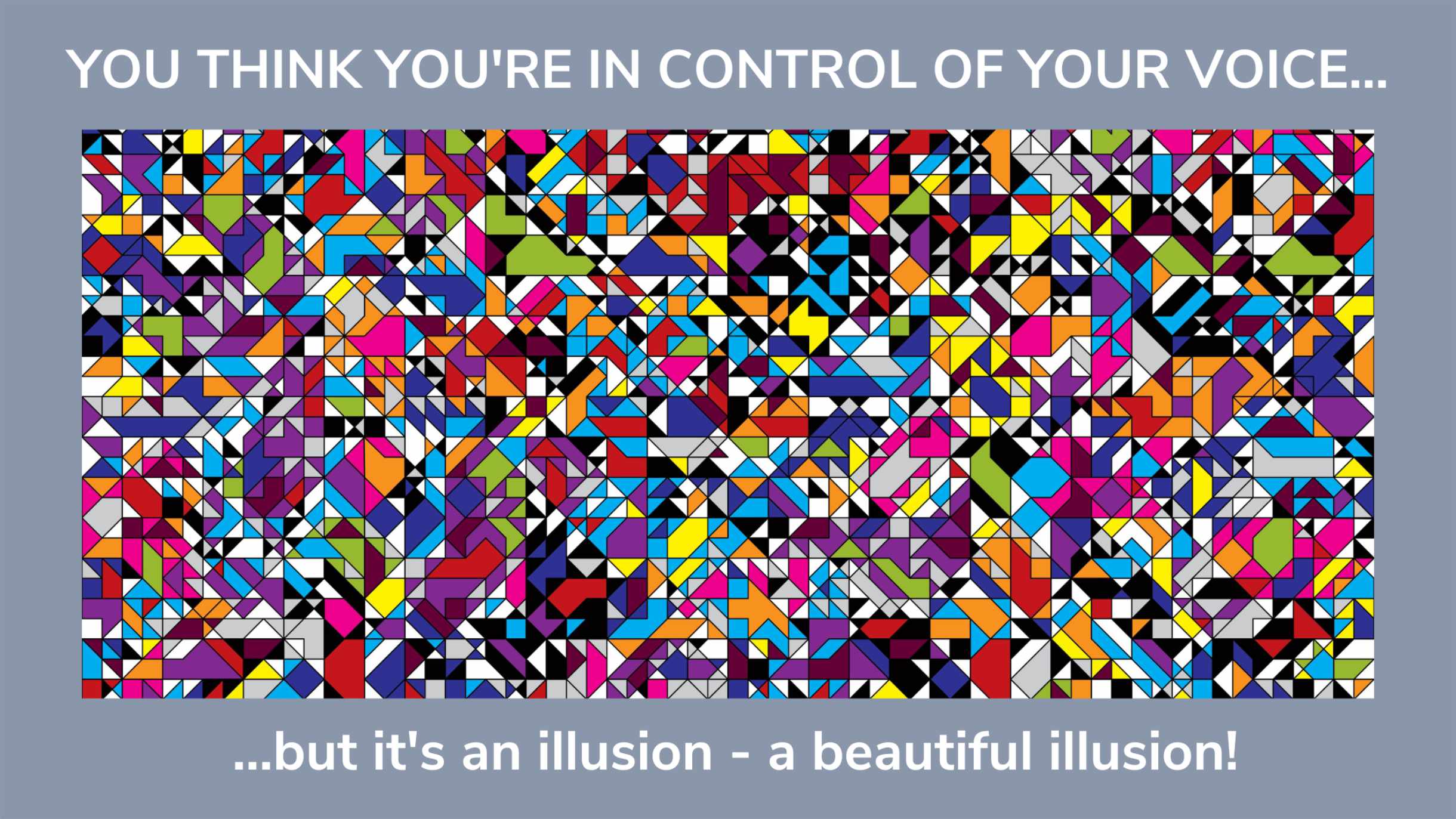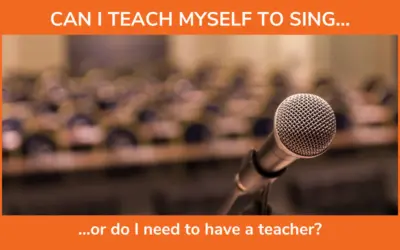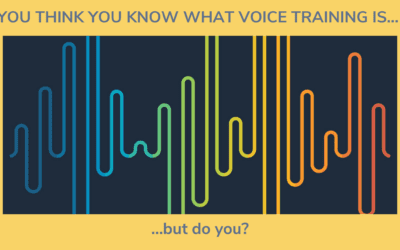Inside This Article
YOU THINK YOU’RE IN CONTROL OF YOUR VOICE…BUT IT’S AN ILLUSION! HERE’S WHY:
We’re all looking for vocal control… which makes sense – we want to be able to do what we want with our bodies and our voices – but, we cannot control our voice in order to be in control of our voice.
Let me explain…
When we sing or speak (or simply make sounds with our voice) we are turning our intention to make sound into the action of making sound. These are two very different things and the distinction is important to make clear, so I’ll give it a go…
INTENTION VS. ACTION:
The part of you that consciously intends to do something vocally is NOT the part that does it.
When we are learning to sing – or use our voice in new ways – we need to be educating both aspects of this process at the same time: the part that intends and the part that acts.
When this educational process goes well, it is one that facilitates our access to and awareness of our many options for doing something. There are many ways to make the “same sound” – these are called “sound equivalents” and sometimes we’d be surprised to see what we’re actually doing vs. what we think we are doing!
So when learning, we need to both learn how to do things we don’t yet know how to do AND learn how to do those things that we already know how to do in LOTS of different ways so that we have as many options as possible to meet life!
This is important because things change – physically, emotionally, environmentally, situationally – and only having one way to do something means we are less likely to adapt when we need to and more likely to hurt ourselves in the process!
Another part of this educational process is to be presented with a situation in which our nervous system (I like to just call it “our system”) can select the most optimal of these options that we’ve learned and redundified (boom, new word!) for a given task or situation, on the spot and in the moment!
Lucky for us, as singers, we have a perfect situation in which our system can continuously choose and re-choose based on these options… SINGING. (This is why I use singing as a reference before and after a lesson and not as the lesson itself.)
When we learn in this way our “system” (vocal and otherwise) almost automatically improves.
THE SINGING SELF:
A SINGING SELF lesson is basically that. We are asking: What are the options? Let’s sense and explore them.
Most people are so surprised by the lessons and classes that facilitate this kind of learning. They say… “Wow! I’m doing something new, it’s happening! But, I don’t know why. I don’t even know what I’m doing.”
And I say. “That’s great. Your system is learning and updating. Stick with the process and the part of you that is more aware and intentional will eventually understand more and more. You’ll learn from your own system.”
So, when we build up enough options and awareness through learning in this way, it’s the intention to sing that offers the functional impetus for our system to improve and put those new options to good use.
And, this, as we learn and sing more and more, becomes a virtuous cycle. After a while, it becomes a way of life and the benefits are amazing.
Related: Understanding Vocal Support, the Bare Bones of Singing
WHAT?!?: How could this be true?
You might be thinking…
“How could this be true?
- Don’t I constantly have to be telling my body what to do?
- Don’t I have to practice and practice what the experts say I should be doing?
- Don’t I have to whip my voice into shape?”
NO!
In fact, trying to do so without this profound exploration of options and awareness of sensations will only screw things up. By attempting to control your system from the outside, you might see some gains at first, but they soon fade, become rigid or cause other problems down the line.
And, because it’s all external, one has to keep controlling to stay in control. It’s a vicious cycle. And, eventually, we give up, or even worse (and I’ve seen this time and again) we end up de-functionalizing our system by interfering in its processes.
By attempting to control your system from the outside, (and I’ve seen this time and again) we end up de-functionalizing our system by interfering in its processes.
Robert sussuma
THE CONTROL OF NO CONTROL:
Your system (background, most powerful part of yourself) is doing its best so that you (foreground, intentional part of yourself) can do its best.
What we want to do is educate our system (the background) to have more and more options and possibilities through experience which means we (the foreground; the reflective, intentional part of ourselves) needs to get out of the way and let the learning happen in the background, in the system itself.
This is why sometimes I say, “these lessons are not for “you” they are for your system” – which is also you, of course, but it’s a bigger, more expansive part of you that you cannot control consciously. You can direct it, you can interact with it, but it’s in control of “you”- for better or worse.
The AMAZING part is, that your system is primed to learn and improve in this way and given the right circumstances and experiences you (the BIG YOU) will learn and grow – it’s natural.

So here’s how it should work, in short: we have an intention (to sing a high note, for example) in the foreground. This intention must coordinate with everything else that’s happening in YOU (the background, your whole system)—balance, breath, movement, emotions, digestion, senses, musicality, artistry, character, etc. for it to happen in the best possible way.
That’s a lot to coordinate! That’s why the background needs to be educated.
But, most teachers are only dealing with the foreground. Very few work with the background.
What makes the impossible possible is what happens in the background!
Robert Sussuma
Over focus on the foreground cheats us out of reaching our full potential – vocal or otherwise!
The SINGING SELF work is all about the background. We work with the foreground too, but lightly and mainly as the situation for organizing the background. Any direct foreground work is so hidden in the lessons that you have to be very well trained in voice and somatic learning to see it. And that is intentional. If you saw it too soon, you’d try to control it in the foreground.
Doing it this way lets the background get it while the foreground part of you facilitates the process, but doesn’t interfere or try to take over. This is what I call “the control of no control.” It takes a lot of awareness to have total control while releasing control at the same time, but it’s possible!
This is why some of my classes and lessons seem so strange at first, but once you get the hang of it, you’ll be amazed at how much you can and will improve without trying to improve. It happens. So many of my students are enjoying “the control of no control” now as they continue to educate their systems to do more and more of the work in the background with elegance and ease. You can too!
Check out THE SINGING SELF PROGRAM if you’re ready to make this learning paradigm shift and release “small control” to enjoy “BIG CONTROL!”
If you’re a voice teacher and want to not only experience this for yourself but also bring this kind of learning into your voice studio, check out THE TEACHER TRACK!





0 Comments